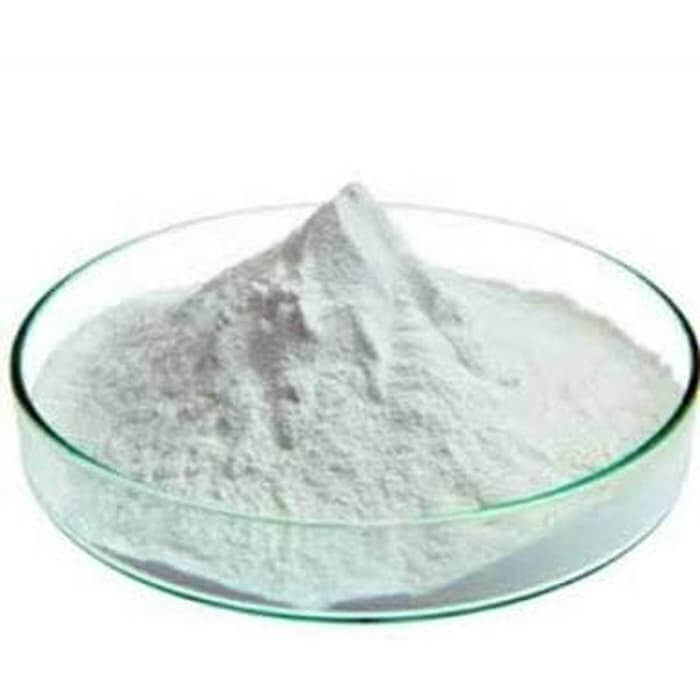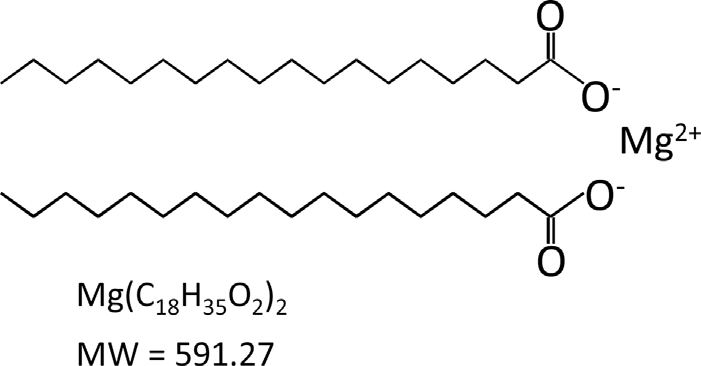Magnesium stearate is a chemical compound made up of magnesium and stearic acid.
It is also known as octadecanoic acid or magnesium salt.
It is made by combining magnesium with stearic acid, which occurs naturally in lots of foods including eggs, cheese, chicken, coconut oil, palm oil, cotton seed oil, salmon, walnuts, and chocolate.
Magnesium stearate is commonly used as a lubricant or flow agent in the manufacturing process of supplements and pharmaceuticals.
Even though its primary use is in pharmaceuticals, magnesium stearate is also used as an additive in food to help improve food consistency.
When used in medicine, it not only works as a flow agent but also slows down the absorption of the meds to allow them to get to the intended area before they are absorbed.
Is Magnesium Stearate Safe For Dogs?

While magnesium stearate is generally safe for humans, the same may not be said of dogs.
Experts advise against administering drugs or food that contains this substance to your dog because it can cause health complications.
For instance, some studies have linked magnesium stearate to immune system suppression.
A dog’s immune system is responsible for fighting off infection and disease.
It, therefore, means that if the immune system is suppressed, your dog will be more susceptible to infections and illnesses.
They may also have a harder time recovering from injuries or surgeries.
Magnesium stearate can also damage your dog’s liver and skin if they are exposed to it in high doses.
This is because the stearic acid in magnesium stearate is metabolized by the liver into a toxic substance called tetradecylthiuram disulfide (TTD).
TTD is known to cause liver damage, and it is particularly harmful to dogs.
TTD is bad for both humans and dogs but considering that dogs are much smaller, the damage can happen way faster than in humans—it can just get damaged in a couple of days.
There is also a good chance that magnesium stearate can result in biofilm formation in the gut.
A biofilm refers to a group of microorganisms that stick together and form a protective layer on surfaces, like the lining of the intestines.
Biofilm formation may lead to intestinal inflammation and digestive issues in dogs.
This can result in digestive discomfort and even impede nutrient absorption in your dog.
Another reason why you should avoid products that have magnesium stearate is the fact that it is not the best form of magnesium.
Unlike magnesium citrate or glycinate, magnesium stearate is not easily digested or absorbed.
As a consequence, it will strain some organs in your dog’s body which can lead to disease and discomfort.
Some dogs may also have an allergic reaction to the compound, causing symptoms such as itching, rashes, and difficulty breathing.
Suffice it to say that the best way to ensure your dog’s safety is to avoid giving them anything that contains magnesium stearate.
If you are unsure, ask your veterinarian for advice or look for alternative options.
It’s always better to be safe than sorry when it comes to the health and well-being of our furry friends.
Is Magnesium Stearate the Same As Magnesium?
No, magnesium stearate is not the same as magnesium.
Magnesium stearate is a salt that is formed when magnesium combines with stearic acid.
It is often used as a lubricant or flow agent in pharmaceutical manufacturing.
Magnesium, on the other hand, is a mineral that is found naturally in the environment.
It is one of the most abundant elements in the earth’s crust and is an essential nutrient.
While magnesium stearate can be found in some dietary supplements, it is not the same as magnesium and does not provide the same health benefits.
Unlike magnesium stearate which is not safe for dogs, magnesium is safe and is often added to dog food as a nutritional supplement.
However, it should only be consumed in small quantities because too much magnesium can cause gastrointestinal upset and diarrhea.
In addition, magnesium supplements should be used with caution in dogs with kidney disease, as the kidneys play a role in clearing excess magnesium from the body.
If you are considering adding a magnesium supplement to your dog’s diet, talk to your veterinarian first to determine the appropriate dosage and to make sure that your dog does not have any underlying health conditions that could be exacerbated by magnesium supplementation.
Do Dogs Need Magnesium?

Yes, dogs need magnesium for their overall health and well-being.
It is involved in many important bodily functions including muscle contraction, nerve transmission, energy production, and bone development.
A magnesium deficiency can lead to symptoms such as weakness, tremors, seizures, and abnormal heart rhythms.
Other easier-to-identify signs include hyperactivity, stiffness, and anxiety.
While dietary sources of magnesium are typically enough to meet a dog’s needs, supplementation may be necessary in certain cases such as when a dog has a medical condition that affects its absorption or utilization of magnesium.
Some magnesium supplements that are better alternatives for stearate include magnesium chloride, magnesium sulfate, and Magnesium L-Threonate.
As with any supplement, it is important to consult with your veterinarian before giving your dog any additional magnesium.
The vet may do a blood test to ascertain if your dog really has magnesium deficiency or if it is some other ailment.
In Summary…
While magnesium stearate may have some uses in the manufacturing process of certain consumables, it is not a good form of magnesium and should be avoided in dogs due to potential health concerns.
If your dog has magnesium deficient and needs supplementation, go for supplements that have other forms of magnesium like citrate or glycinate that are easier for the body to absorb.
Always consult with your veterinarian before giving your dog any supplements, including magnesium.
Granted, not all dogs will suffer the side effects of magnesium stearate but since there is no way of knowing which dog will be affected, it is better to err on the side of caution and steer clear of magnesium stearate in your dog’s diet.
You may also want to check:
Is Potassium Sorbate Safe For Dogs?
Is Sodium Benzoate Safe For Dogs?
As an Amazon Associate, we may receive a small commission from qualifying purchases but at no extra cost to you. Learn more. Amazon and the Amazon logo are trademarks of Amazon.com, Inc, or its affiliates.


